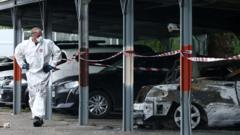The French government is facing mounting pressure as a series of violent attacks targeting prisons occurs. While officials have explored various theories, including potential extremist or foreign involvement, current evidence points towards drug gangs retaliating against recent law enforcement initiatives.
Rising Tensions: French Prisons Under Siege Amid Drug Gang Warfare

Rising Tensions: French Prisons Under Siege Amid Drug Gang Warfare
A recent surge of arson and gunfire attacks on French prisons has authorities speculating the involvement of drug gangs as a response to the government's crackdown on drug trafficking.
In a concerning escalation of violence, French prisons have recently been subjected to multiple arson and gun attack incidents, which are believed to be orchestrated by drug gangs retaliating against a new governmental effort to combat drug trafficking. Since Sunday night, authorities are investigating 12 separate incidents, including vandalized vehicles outside jails and gunfire directed at prison facilities.
While all investigative avenues remain theoretically open, including the possibility of extremist or foreign influence, the prevailing suspicion leans towards drug gangs. Interior Minister Bruno Retailleau articulated this viewpoint, asserting that these groups are responding to a declared war on their operations instigated by the government's new legislative measures. He stated, "It's not they who have declared war on us. It's we who declared war on them with our new law on drugs trafficking."
In a conspicuous display of coordination over the span of three nights, these gangs targeted cars outside prisons and a prison officer training center, even employing firearms in certain instances. Graffiti that read “DDPF” (Droits des Prisonniers Français - Rights for French Prison Inmates) was left at the scene, alongside a video circulating on Telegram, which attempted to position the attackers as advocates for prisoners' rights.
This strategy of adopting a human rights narrative is atypical for drug cartels. Analysts noted that the characterization of the DDPF does not align closely with traditional far-left groups, which typically feature a more intellectual or socially aware base. Rather, the individuals involved in the attacks appeared to be more aligned with the cohort often linked to drug trafficking organizations, as evidenced by their attire and mistyped graffiti.
Speculation persists regarding foreign interference, particularly after notable instances of Russian manipulation in recent events, and deteriorating relations between France and Algeria. However, the hypothesis that drug gangs are behind the unrest remains compelling due to their clear motive and accessible means.
In response to the unsettling events, the French government—united under a right-wing political leadership—has been advocating for stringent anti-drug legislation aimed at dismantling these organized crime networks. This initiative is being bolstered by the establishment of specialized processing offices and the conversion of existing prisons into high-security facilities for incarcerated drug lords, featuring stricter visitation regulations.
One fundamental concern for the French state involves preventing criminal figures from orchestrating drug operations from within prison walls, an issue highlighted by the recent case of a notorious drug lord whose prison escape led to violent confrontations with law enforcement.
Government officials interpret the violent attacks on prisons as indicative of a newfound fear among drug gangs as authorities intensify their crackdown, providing political leverage as they promote their tougher stance on crime to voters. The pivotal moment will arise once one of the attackers is apprehended to shed light on the motivations behind these assaults—a development investigators anticipate will unfold soon.



















